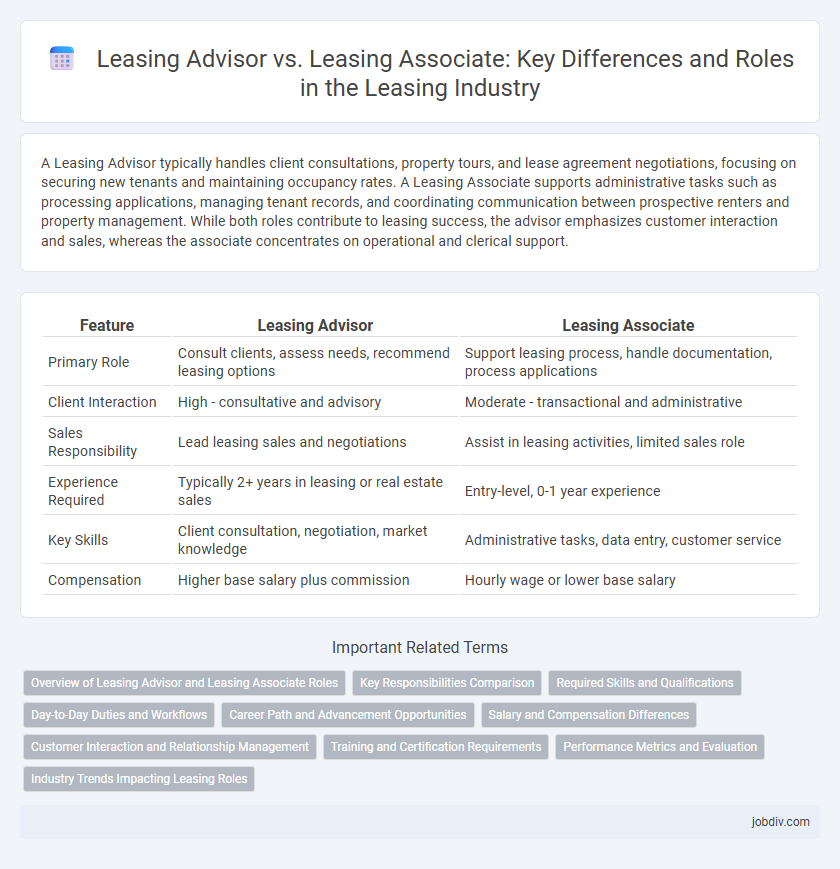A Leasing Advisor typically handles client consultations, property tours, and lease agreement negotiations, focusing on securing new tenants and maintaining occupancy rates. A Leasing Associate supports administrative tasks such as processing applications, managing tenant records, and coordinating communication between prospective renters and property management. While both roles contribute to leasing success, the advisor emphasizes customer interaction and sales, whereas the associate concentrates on operational and clerical support.
Table of Comparison
| Feature | Leasing Advisor | Leasing Associate |
|---|---|---|
| Primary Role | Consult clients, assess needs, recommend leasing options | Support leasing process, handle documentation, process applications |
| Client Interaction | High - consultative and advisory | Moderate - transactional and administrative |
| Sales Responsibility | Lead leasing sales and negotiations | Assist in leasing activities, limited sales role |
| Experience Required | Typically 2+ years in leasing or real estate sales | Entry-level, 0-1 year experience |
| Key Skills | Client consultation, negotiation, market knowledge | Administrative tasks, data entry, customer service |
| Compensation | Higher base salary plus commission | Hourly wage or lower base salary |
Overview of Leasing Advisor and Leasing Associate Roles
Leasing Advisors primarily focus on building relationships with prospective tenants, conducting property tours, and providing detailed information about leasing terms and property features to secure leases. Leasing Associates handle more administrative responsibilities, including processing applications, preparing lease documents, and managing tenant records to ensure compliance and smooth onboarding. Both roles are essential in driving occupancy rates and maintaining tenant satisfaction within property management operations.
Key Responsibilities Comparison
Leasing Advisors primarily focus on building client relationships, conducting property tours, and processing lease agreements to ensure tenant satisfaction and occupancy rates. Leasing Associates handle administrative tasks such as managing rental applications, coordinating maintenance requests, and supporting the leasing team with database management and documentation. Both roles contribute to effective property management, but Advisors emphasize direct tenant engagement while Associates support operational efficiency.
Required Skills and Qualifications
Leasing Advisors typically require strong sales abilities, excellent customer service skills, and in-depth knowledge of property management software to effectively engage potential tenants and close leases. Leasing Associates need solid communication skills, attention to detail for handling lease documents, and basic knowledge of Fair Housing laws to support the leasing process efficiently. Both roles benefit from proficiency in CRM systems, but Advisors often have more advanced negotiation and marketing expertise compared to Associates.
Day-to-Day Duties and Workflows
Leasing Advisors primarily engage with prospective tenants by conducting property tours, explaining lease terms, and qualifying applicants, ensuring high occupancy rates through effective communication and customer service. Leasing Associates focus more on administrative tasks such as processing lease applications, managing lease documentation, and coordinating move-in and move-out procedures to maintain accurate records and smooth tenant transitions. Both roles collaborate closely but differ in that Advisors emphasize sales and tenant relations, while Associates handle back-office functions and operational workflow efficiency.
Career Path and Advancement Opportunities
Leasing Advisors typically hold a more strategic role than Leasing Associates, focusing on client relationship management and advanced leasing negotiations. Career advancement for Leasing Advisors often leads to positions such as Leasing Manager or Property Manager, reflecting increased responsibilities and leadership opportunities. Leasing Associates usually start in entry-level positions, providing foundational experience that can lead to promotion into Leasing Advisor roles.
Salary and Compensation Differences
Leasing Advisors typically earn higher salaries than Leasing Associates, reflecting their greater responsibilities in client management and lease negotiations. Compensation packages for Leasing Advisors often include bonuses or commissions tied to lease performance, increasing their overall earnings. Leasing Associates receive more standardized salaries focused on administrative support and property walkthroughs, resulting in lower total compensation compared to Advisors.
Customer Interaction and Relationship Management
Leasing Advisors excel in customer interaction by providing personalized consultations and tailored property recommendations to enhance client satisfaction and retention. Leasing Associates focus on efficient processing of rental applications and lease agreements while maintaining professional communication to support smooth tenant onboarding. Both roles prioritize relationship management but differ in depth of client engagement and problem-solving responsibilities.
Training and Certification Requirements
Leasing Advisors typically require comprehensive training in property management, customer service, and real estate laws, often supported by certification programs such as Certified Leasing Professional (CLP). Leasing Associates usually undergo basic training focused on leasing procedures, tenant relations, and computer skills, with fewer certification demands. Advanced certifications and ongoing education are more critical for Leasing Advisors to handle complex lease negotiations and compliance issues.
Performance Metrics and Evaluation
Leasing Advisors and Leasing Associates both play crucial roles in property management, but their performance metrics differ significantly. Leasing Advisors are evaluated primarily on lease conversion rates, tenant retention, and overall portfolio growth, reflecting their strategic impact on leasing success. Leasing Associates focus on customer service metrics, application processing speed, and daily contact volume, emphasizing operational efficiency and tenant engagement.
Industry Trends Impacting Leasing Roles
Leasing Advisors and Leasing Associates are experiencing evolving roles due to increased digitization and data-driven decision-making in the real estate industry. Leasing Advisors typically focus on strategic client engagement and market analysis, leveraging advanced CRM tools to optimize tenant acquisition and retention. Leasing Associates often concentrate on operational support and property showings, adapting to new virtual tour technologies and automated lease processing systems.
Leasing Advisor vs Leasing Associate Infographic

 jobdiv.com
jobdiv.com